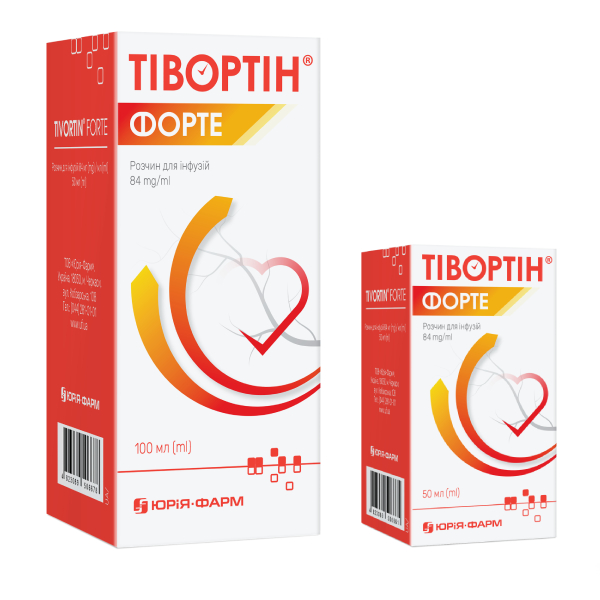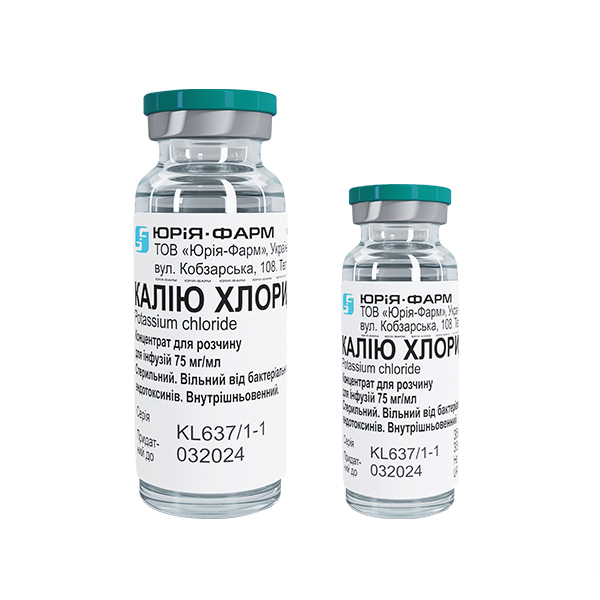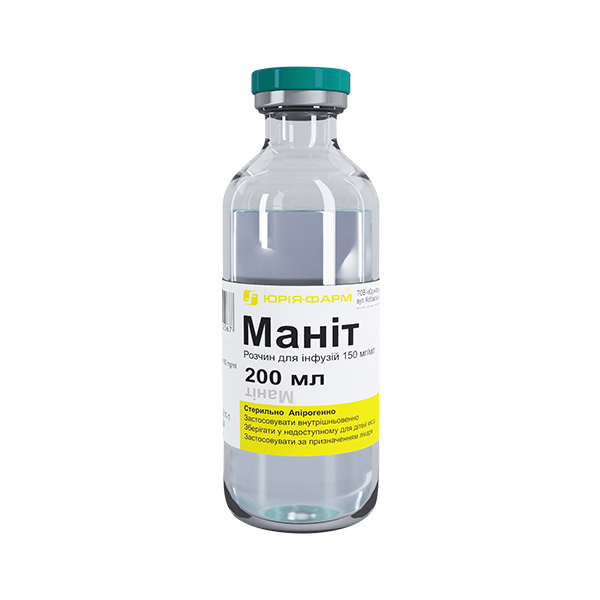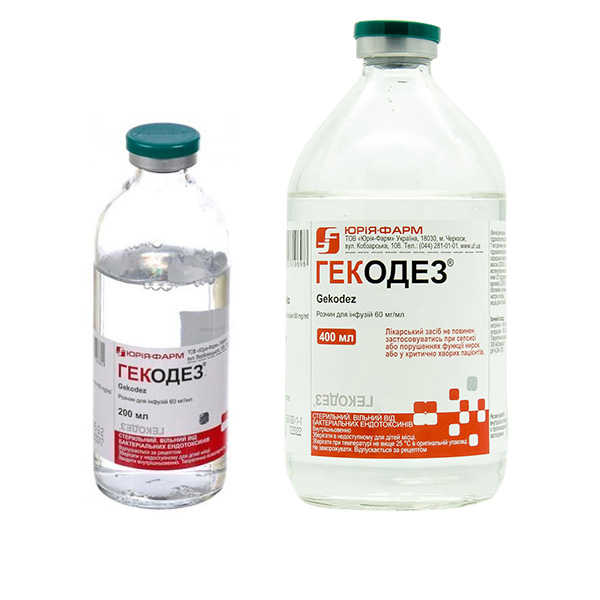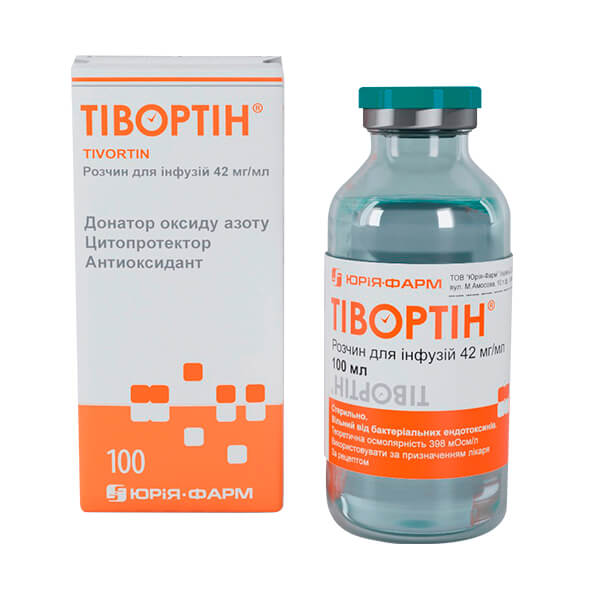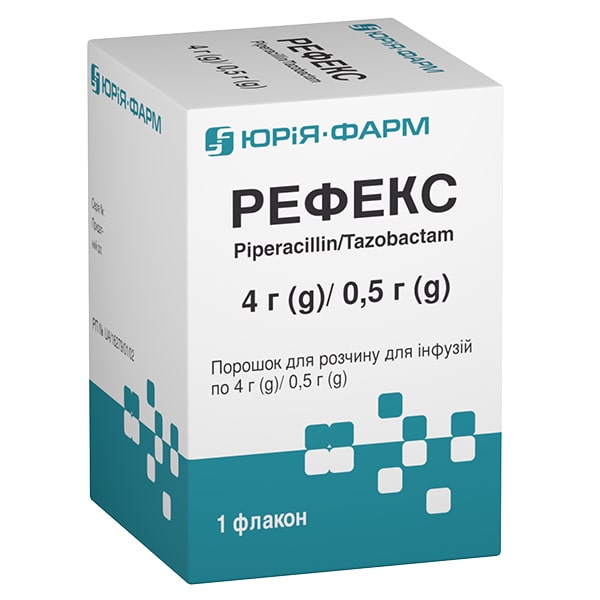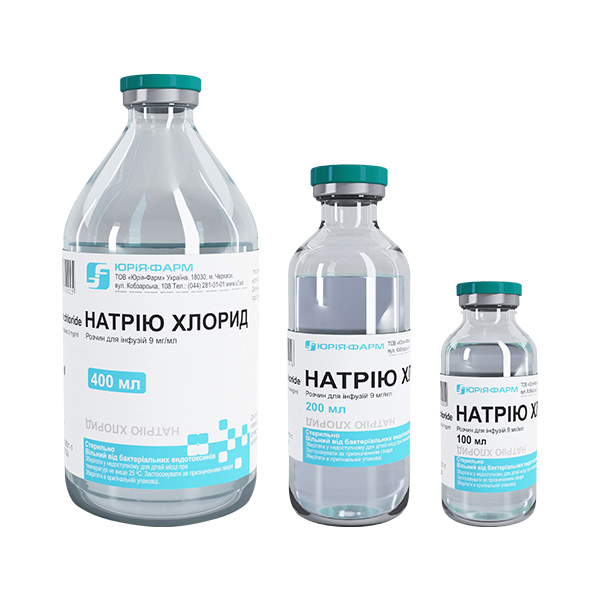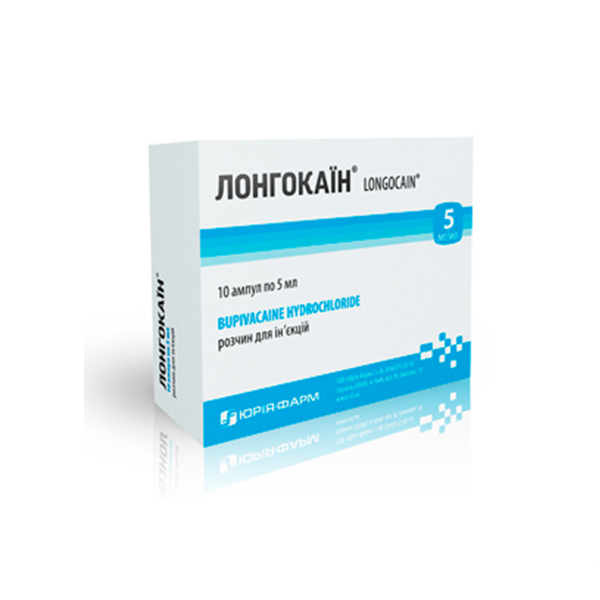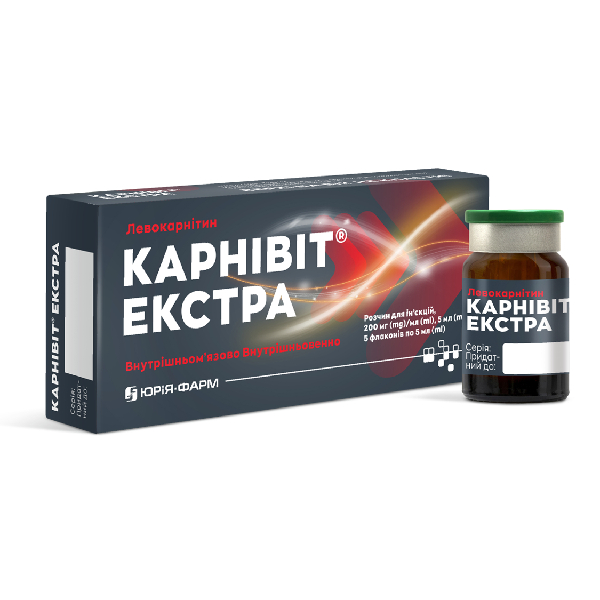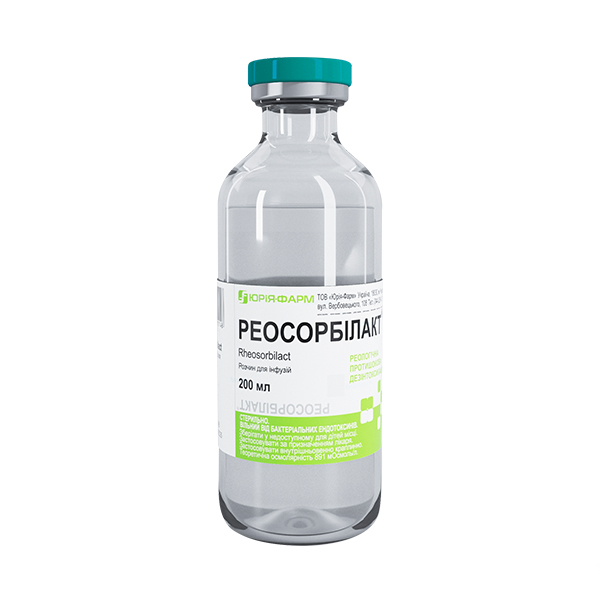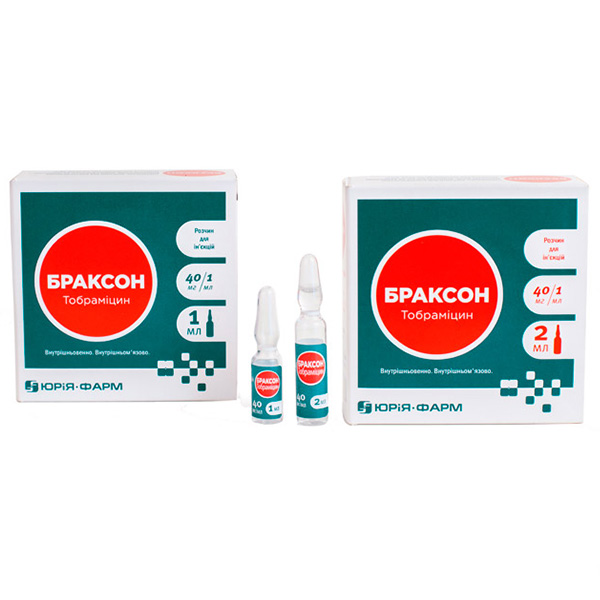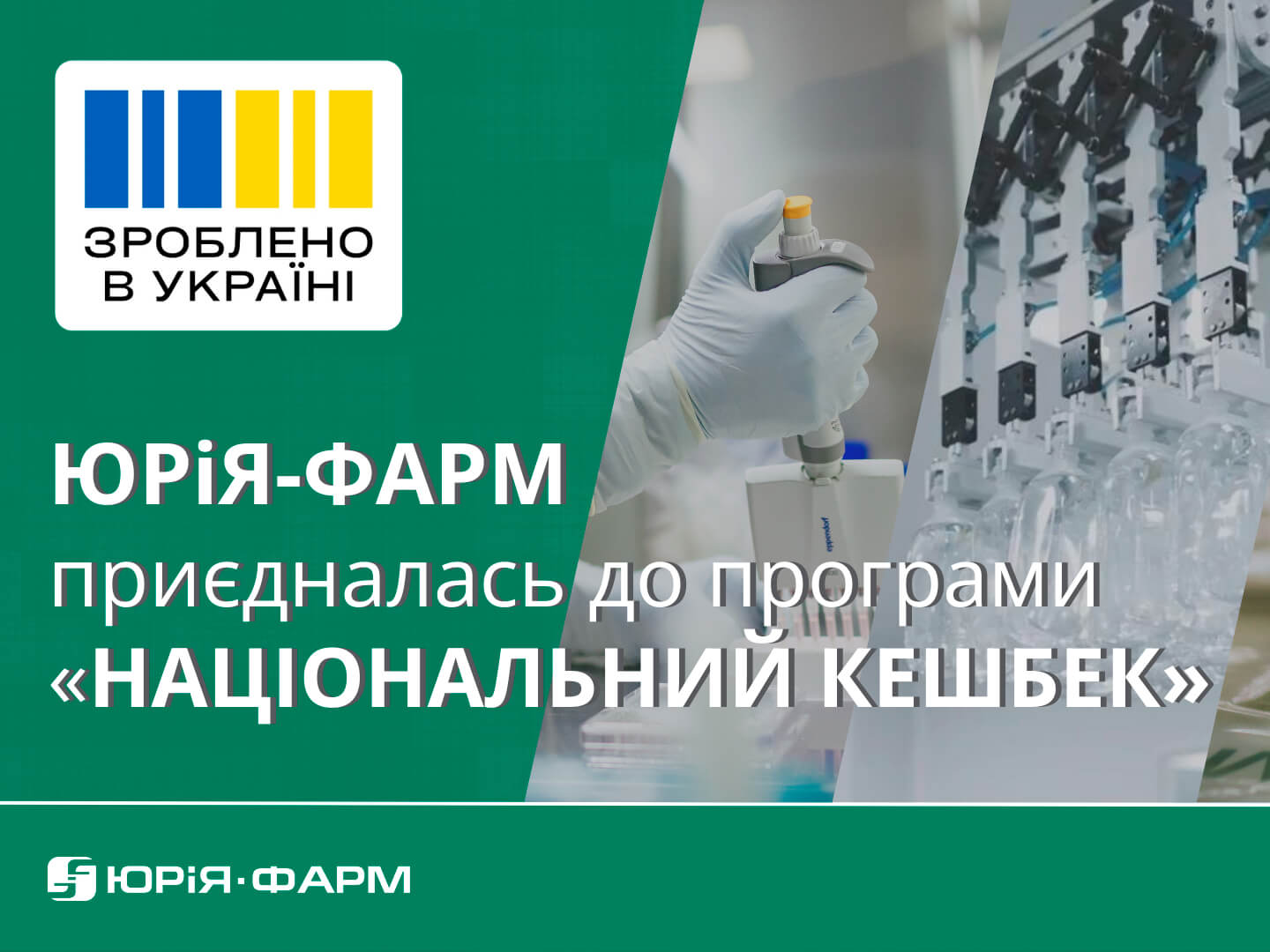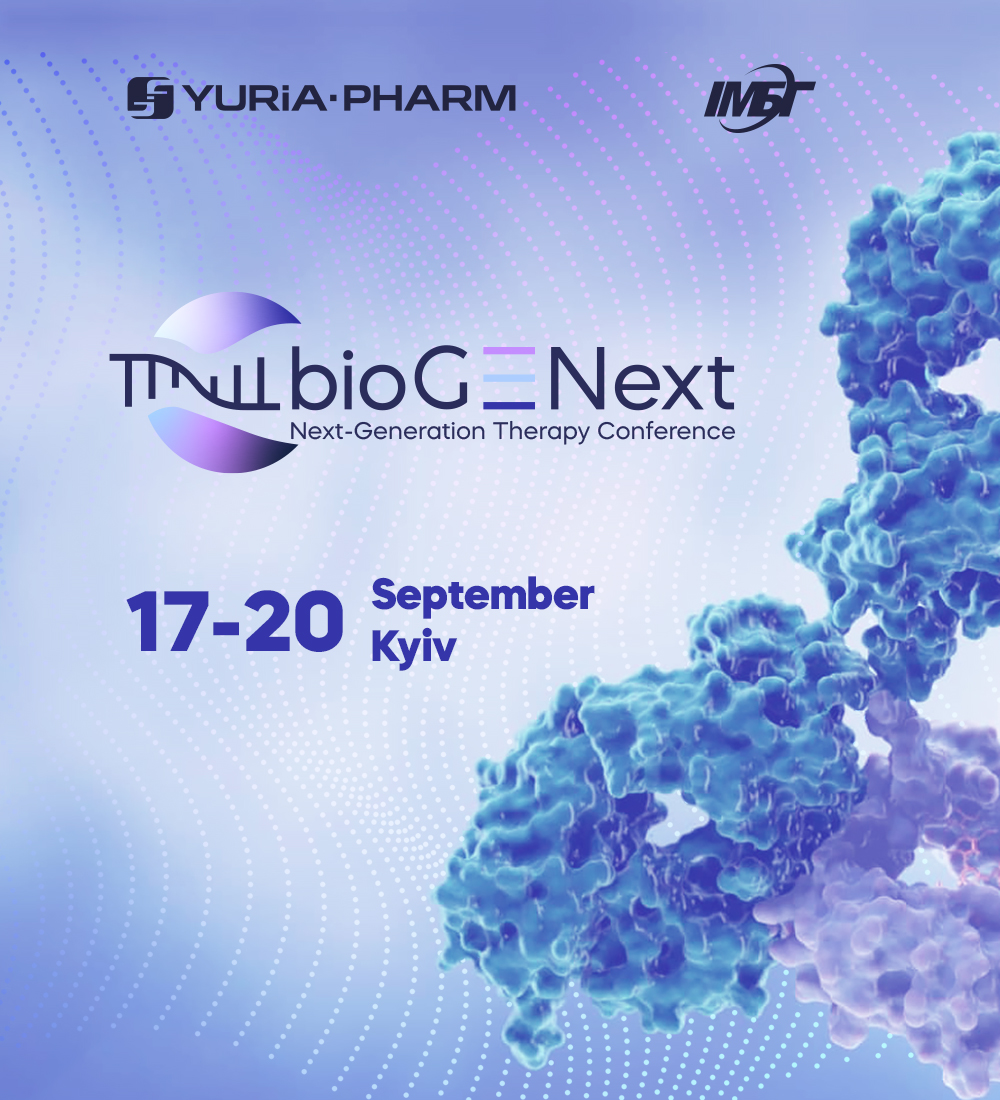Tivortin Forte
Tivortin Forte 8.4% is the only highly concentrated arginine formula for infusion in Ukraine.
The active substance amino acid L-arginine is the only substrate for the synthesis of nitric oxide (NO) in the human body.
Tivortin Forte is a powerful vasodilator, regulator of vascular tone.
Tivortin Forte is a universal angioprotectorwhich detects activity:
- Antihypoxic
- Membrane stabilizing
- Cytoprotective
- Antioxidant
- Anti-radical
- Detoxification
It is used for the complex treatment of atherosclerosis of the vessels of the heart and brain, atherosclerosis of peripheral vessels, including those with manifestations of intermittent claudication, diabetic angiopathy, arterial hypertension, chronic heart failure, hypercholesterolemia, chronic obstructive pulmonary diseases, pulmonary hypertension.
- Unlike all representatives of the parenteral arginine market, which have an arginine concentration of 4.2%, Tivortin Forte is the only highly concentrated 8.4% L-arginine solution on the Ukrainian market.
- This allows you to achieve the desired clinical effects at the expense of one bottle of Tivortin Forte 8.4% per day, without overloading the patient with liquid.
Tivortin Forte is the only highly concentrated 8.4% arginine formula for clinically effective NO therapy.
Release form: bottle of 50 ml, 100 ml.
How supplied
Sales markets
Ukraine
Instruction
PACKAGE LEAFLET
for medical use of a medicinal product
TIVORTIN® Forte
Qualitative and quantitative composition:
- active substance: arginine hydrochloride;
- 1 ml contains 84 mg of arginine hydrochloride;
- excipient: water for injection.
Pharmaceutical form. Solution for infusion.
Major physical and chemical properties: transparent colorless or slightly yellow till brown solution. The theoretical osmolarity is 797 mosmol/L.
Pharmacotherapeutic group. Blood substitutes and perfusion solutions. Intravenous solution additives. Amino acids. Arginine hydrochloride.
ATC code B05X B01.
Pharmacological properties.
Pharmacodynamic properties.
Arginine (alpha-amino-delta-guanidinovaleric acid) is an amino acid that belongs to the class of conditionally essential amino acids and is an active and versatile cellular regulator of numerous vital functions of the body, and exhibits important protective effects in critical conditions.
Tivortin® Forte has an antihypoxic, membrane-stabilizing, cytoprotective, antioxidant, antiradical, and detoxifying effect, acts as an active regulator of intermediate metabolism and energy supply processes, and also plays a role in maintaining hormonal balance in the body. Arginine is known to increase blood insulin, glucagon, human growth hormone, and prolactin, takes part in proline, polyamine, and agmatine synthesis, becomes involved in the processes of fibrinogenolysis, spermatogenesis, and has a membrane-depolarizing effect.
Arginine is one of the major substrates in the urea synthesis cycle in the liver. The hypoammonemic effect of the medicinal product is produced through activation of the conversion of ammonia to urea. It has a hepatoprotective effect due to its antioxidant, antihypoxic, membrane-stabilizing activity, and a positive effect on energy supply in hepatocytes.
Tivortin® Forte is a substrate for NO synthase, an enzyme that catalyzes nitric oxide synthesis in endothelial cells. The drug product activates guanylate cyclase and increases the level of cyclic guanidine monophosphate (cGMP) in the vascular endothelium, reduces the activation and adhesion of leukocytes and platelets to the vascular endothelium, inhibits adhesion proteins VCAM-1 and MCP-1 synthesis, thereby preventing the formation and development of atherosclerotic plaques, inhibits endothelin-1 synthesis, which is a powerful vasoconstrictor and stimulator of proliferation and migration of smooth muscle cells of the blood vessel wall. Besides, arginine hydrochloride inhibits asymmetric dimethylarginine synthesis, a potent endogenous stimulator of oxidative stress. The medicinal product stimulates the activity of the thymus gland, which produces T cells and regulates blood glucose during exercise. It has an acid-forming effect and helps to correct the acid-base balance.
Pharmacokinetic properties.
With continuous intravenous infusion, the maximum concentration of arginine hydrochloride in the plasma is observed 20-30 minutes after the start of administration. Arginine hydrochloride penetrates the placental barrier and is filtered in the renal glomeruli but is almost completely reabsorbed in the renal tubules.
Clinical particulars.
Therapeutic indications.
Metabolic alkalosis, hyperammonemia, atherosclerosis of the coronary and brain vessels, atherosclerosis of peripheral vessels, including intermittent claudication, diabetic angiopathy, hypertension, congestive heart failure, hypercholesterolemia, chronic obstructive pulmonary disease, and pulmonary hypertension.
Contraindications.
Hypersensitivity to the medicinal product. Severe renal dysfunction, hyperchloremic acidosis; past allergic reactions; use of potassium-sparing diuretics and spironolactone. Myocardial infarction (including the past medical history).
Interaction with other medicinal products and other forms of interactions.
When using Tivortin® Forte, it should be considered that it may cause severe and persistent hyperkalemia in patients with renal failure who are taking or were taking spironolactone. Previous use of potassium-sparing diuretics can also cause an increase in potassium levels in the blood. Co-administration of aminophylline may increase insulin levels in the blood.
Arginine is incompatible with thiopental.
Special warnings and precautions for use.
In patients with renal insufficiency, urine output and plasma potassium levels should be monitored before the start of the infusion, as the medicinal product may cause hyperkalemia.
The drug product should be used with caution in case of endocrinal dysfunction. Tivortin® Forte may stimulate insulin and growth hormone secretion.
Blood glucose levels should be checked in case dryness in the mouth is experienced.
Caution is required in patients with electrolyte metabolism disorders and kidney diseases. If symptoms of asthenia increase while taking the medicination, the treatment should be discontinued.
The drug product should be used with caution in patients with angina pectoris.
Pregnancy and breastfeeding.
The medicinal product crosses the placental barrier, so during pregnancy it can be used only when the expected benefit to the mother outweighs the potential risk to the fetus.
No data are available on the use of the medicinal product during breastfeeding.
Effects on ability to drive and use machines.
Caution should be exercised when driving vehicles or operating other machines, as the medicinal product may cause dizziness.
Posology and method of administration.
The medicinal product is administered intravenously as a drip infusion at a rate of 5 drops per minute for the first 10–15 minutes, and then the administration rate can be increased to 15 drops per minute.
The daily dose is 50 mL of solution.
In case of severe circulation disorders in the central and peripheral vessels, severe intoxication, hypoxia, or asthenic conditions, the dose of the medicinal product can be increased to 100 mL per day.
The maximum infusion rate should not exceed 20 mmoL/h.
For the treatment of metabolic alkalosis, the dose can be calculated as follows:
arginine hydrochloride (mmoL)
______________________________________ ´ 0.3 ´ body weight (kg)
Base excess (Ve) (mmoL/L)
The administration should start with half of the calculated dose. Possible additional corrections should be considered after receiving the results of the updated acid-base balance.
Children.
There is insufficient data on medicinal product use in children.
Overdose.
Symptoms: renal failure, hypoglycemia, metabolic acidosis.
Treatment. In case of an overdose, the administration of the medicinal product should be discontinued. Physiological reactions and vital functions should be monitored. If necessary, administer alkalizing agents, diuretics (saluretics), and electrolyte solutions (0.9 % sodium chloride solution, 5 % glucose solution). Symptomatic treatment.
Undesirable effects.
General disorders: hyperthermia, fever, body aches.
Musculoskeletal system disorders: joint pain.
Gastrointestinal disorders: dry mouth, nausea, vomiting.
Skin and subcutaneous tissue disorders: administration site conditions, including hyperemia, itching, pallor of the skin, up to acrocyanosis.
Immune system disorders: anaphylactic shock, hypersensitivity reactions, including rashes, urticaria, and angioedema.
Respiratory, thoracic and mediastinal disorders: shortness of breath.
Cardiac disorders: fluctuations in blood pressure, changes in heart rate, heart area pain.
Nervous system disorders: headache, dizziness, feeling of fear, weakness, convulsions, tremors, more often when the administration rate is exceeded.
Investigations: hyperkalemia.
Reported adverse reactions
Reporting suspected adverse reactions after registration of a medicinal product is an important procedure. This allows for continued monitoring of the benefit/risk ratio for the respective drug. Healthcare providers and pharmaceutical professionals, as well as patients or their legal representatives should be informed of any suspected adverse reactions and lack of efficacy of the medicinal product through the Automated Pharmacovigilance Information System at the following link: aisf.dec.gov.ua.
Shelf life. 2 years.
Special precautions for storage.
Store below 25°C in the original packaging. Keep away from children.
Incompatibilities.
This medicinal product is incompatible with thiopental.
Nature and contents of container.
50 mL in a glass vial. 1 vial in a cardboard box. 100 ml in a glass bottle. 1 bottle in a cardboard box.
Category of release. Prescription only medicine.
Manufacturer.
Yuria-Pharm LLC.
The manufacturer’s location and address of the place of business.
108, Kobzarska Str., Cherkasy, 18030, Ukraine Tel.: +38 (044) 281-01-01.

